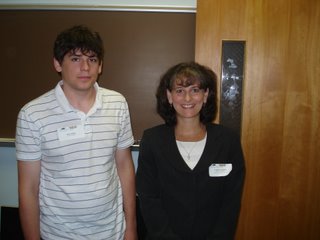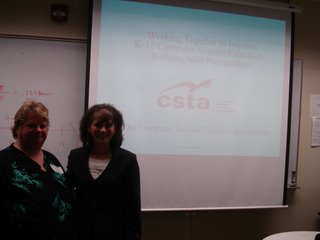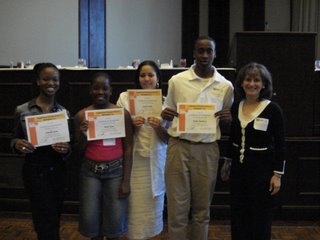The Computer Science Teachers Association (CSTA) executive director, Chris Stephenson, recently posted a blog entry regarding Alabama. See link below:
http://blog.acm.org/csta/ See August 8th entry.
or read it here:
(comments below or by Chris Stephenson, Executive Director CSTA)
August 08, 2006
What if Alabama Led the Way?
Last week I spent a great day at the University of Alabama at Birmingham talking to computer science faculty and local high school computing teachers and administrators about working together to improve K-12 computer science education. During what turned out to be a wide ranging discussion, Alabama Teacher of the Year Cameron McKinley asked some interesting questions:
"What if Alabama decided to lead the country in improving K-12 computer science education? Could this happen? What would it mean for the state and its students?"
Our discussions during the day touched on many so called "local issues". Certification for CS teachers in Alabama is a mess. As Amber Wagner explained, there is no certification for computer science, so computer science teachers have to write the praxis exam in an area that has no computer science content. This is a story I am hearing from CSTA members all across the country.
Jeff Gray of the University of Alabama at Birmingham talked about how student misconceptions
about computer science as a discipline and as a career destination are driving students away from computer science at a time when companies cannot find enough qualified workers to fill the jobs available in the computing field.
And we all admitted that computer scientists in general do a terrible job of explaining our field and why it is so exciting. How many student, for example, really understand that the most exciting breakthroughs in the sciences and even in the humanities require computer science expertise? How many students are even aware that computer science makes the gadgets they love possible? Too few!
What would it take for Alabama to address these and other issues and so become a national leader in K-12 computer science education? First it would take vision and committed leadership at the highest political levels. Fortunately Alabama has "an education governor" so that is a good start. Next it would take the commitment of educators on multiple levels. The University of Alabama at Birmingham Computer Science Department is ready. The folks from the Faculties of Education are getting ready. The teachers I met are very ready.
It would take an unwavering long-term commitment to creating a state-wide computer science curriculum and providing the resources to support it. This would require a plan for on-going professional development for all teachers and a campaign to help students understand the opportunities that are available for them in the computing field. These are things that CSTA would be happy to help with.
Business and industry would have to step up, offering financial and other support. Not just the high tech companies, but the industries that hire 80% of the computer science graduates to keep them up and running, such insurance companies, banks, the auto industry, and the health care industry just to name a few.
Of course, something would have to be done to fix the certification mess. And just maybe, teachers would be paid a livable wage.
What kind of place would Alabama be if it did these things? Alabama would be a place where all students have the opportunity to acquire the computing knowledge and skills required to survive and thrive in this new global economy, Alabama's booming high-tech and medical industry would have access to the skilled workers it needs to drive innovation and economic prosperity. And a world of career opportunities would open up for this and future generations.
Wouldn't it be a great thing? I believe that it is a possible thing.
Chris Stephenson
Executive Director
CSTA







